The Debate About the Sunflower Movement in the Pro-Unification Left
by Brian Hioe
語言:
English /// 中文
Photo Credit: Chinese propaganda poster
IT WOULD SEEM that there is something of a divide among the so-called pro-unification Left about the Sunflower Movement these days. Namely, there seems to be a divide between those who are in some way more sympathetic to the Sunflower Movement as an expression of Taiwanese society and those who would seek to dismiss the movement as a whole. This is perhaps how we can understand the divide within the Taiwanese pro-unification Left in regards to Joyce Liu’s (劉紀蕙) recent article concerning the Sunflower Movement published in Ground Breaking and its critique of older, more traditional voices of the pro-unification Left as Zhao Gang (趙剛).
In the controversy that followed, attempts were made on social media by younger but hardline adherents of the pro-unification Left as Wang Haozhong (王顥中), journalist at Coolloud, to defend Zhao Gang on grounds of Liu conflating individual and collective experience. Zhao Gang would later respond to Liu’s critique in another piece in Ground Breaking. The debate would subsequently attract attention from several Chinese intellectuals broadly affiliated with the New Left, demonstrative of the shared discourse that exists between the Chinese New Left, pro-China Leftist elements in Hong Kong, and the Taiwanese pro-unification Left. For the purposes of this article, however, we will confine our remarks to the debate between Liu and Zhao, with primarily a focus on Liu’s piece where it illustrates what is a heterodox perspective relative to Zhao’s more traditional, hardline pro-unification Left views—even if it, too, remains fundamentally a viewpoint squarely within the camp of the pro-unification Left.
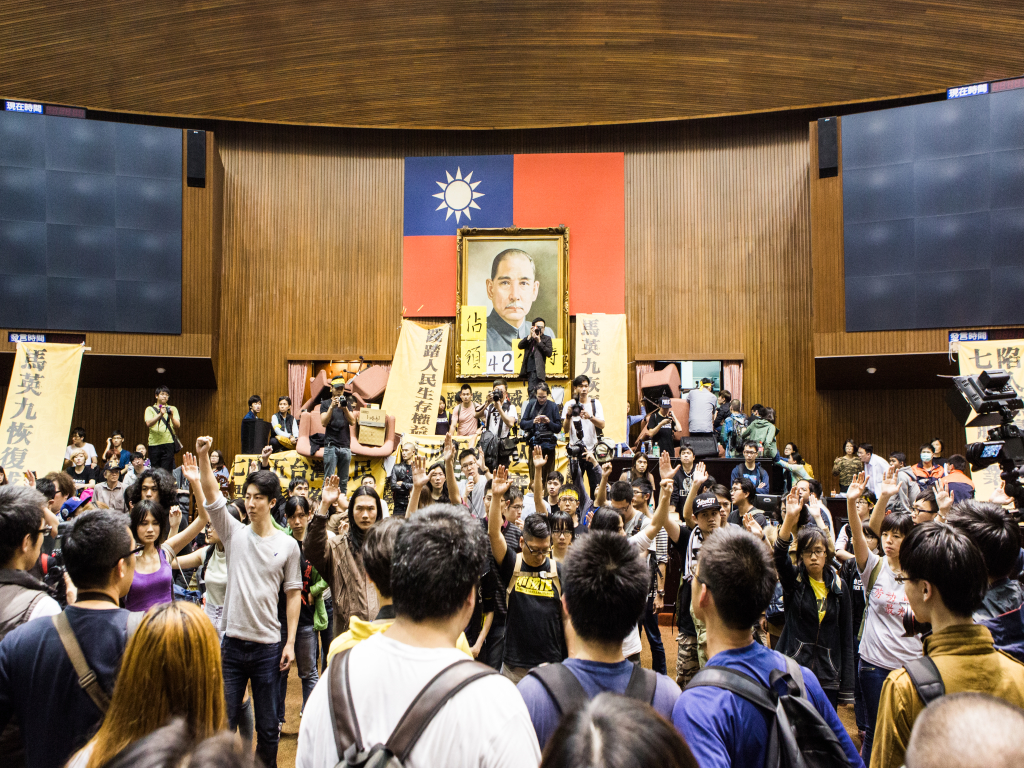 The occupied Legislative Yuan. Photo credit: Democracy at 4 AM
The occupied Legislative Yuan. Photo credit: Democracy at 4 AM
Namely, in the face of the Sunflower Movement, it is hard to dismiss the mass uprising of Taiwanese society. In taking a position of opposition to the Sunflower Movement, the pro-unification Left takes up a position in opposition to most of Taiwanese society. So then, while Joyce Liu ventures an overview of the Sunflower Movement willing to grant it a certain validity that nonetheless concludes in a pro-unification viewpoint. Indeed, Liu devotes over half her article to an account of the Sunflower Movement which demonstrates very detailed attention paid to the movement. By contrast, older, more traditional voices of the pro-unification Left have dismissed the Sunflower Movement out of hand as a ploy of Taiwanese independence activists and the DPP.
Does this suggest a certain controversy in the pro-unification Left regarding their view of the Sunflower Movement and, by extension, their relation to civil society? And it seems that this controversy has in fact gotten out of hand for the pro-unification Left, to the extent that Ground Breaking would later pull all articles that were part of the debate from their website, though Liu’s article is still able to be read at Stand News.
The State of the Pro-Unification Left
SOME TIME EARLIER, I ventured a critique which alleged the Ground Breaking to be a publication of the Taiwanese pro-unification Left, pro-China Leftist elements in Hong Kong, and the Chinese Left, and a publication had a editorial line which advocated a pro-unification viewpoint, even if they did not spell out their views explicitly. It would seem that in response to criticism, as of late, Ground Breaking has seen fit to try and feature a number of articles about Taiwan and the Sunflower Movement. Indeed, even if Ground Breaking tried to dispel criticisms by stating that they were neither a pro-unification nor pro-independence publication at the time, it seemed to me at the time that this was an outright lie in consideration of that between the “Domestic” (國內) and “International” (國際) sections of their site, news about Taiwan was placed in the “Domestic” section. This has since been removed from their website following a redesign. But in hosting the debate between Liu and Zhao, perhaps it is true Ground Breaking had succeeded in featuring more diverse viewpoints in regards to the Sunflower Movement than before and fulfilled its intended aim of stimulating debate—at least, until it backed down from controversy in pulling all related articles to the Zhao-Liu debate.
Meanwhile, outside of Ground Breaking, criticisms coming from other sectors of the pro-unification Left have been more shrill in nature, with continuations of the attacks conducted on Social Democratic Party Li Yan-Rong( 李晏榕) for being the child of wealthy owners of AU Optronics, a corporation with a conservative political orientation and a record of environmental pollution. A previous article in Coolloud by Lin Yizhi (林奕志) stated that this class background of Li Yan-Rong made her a “capitalist candidate,” this despite that she had gone against her parents in running as a candidate of the Socialist Democratic Party, class background apparently being the only determinant of political perspective in such a worldview.
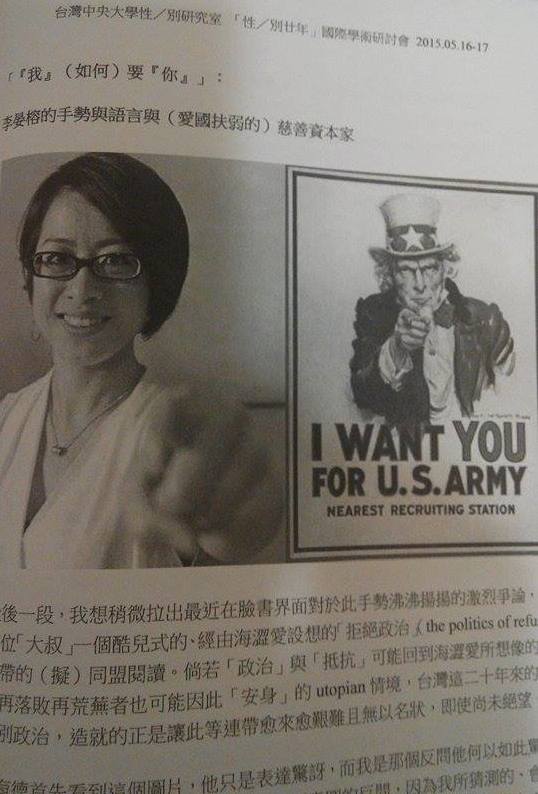 Li Yan-Rong and Uncle Sam. Photo credit: National Central University Department of Sexuality
Li Yan-Rong and Uncle Sam. Photo credit: National Central University Department of Sexuality
Attacks on Li Yan-Rong continue, with Lucifer Hung’s (洪凌) claim in a National Central University journal that a recent campaign ad featuring Li Yan-Rong pointing at the poster draws parallels with World War II era posters of Uncle Sam. Even if it was that in campaign ads Li Yan-Rong is not consciously seeking to imitate Uncle Sam, does so in a depoliticized manner, or her pose actually seems to use the opposite hand to point at the viewer as Uncle Sam, the campaign ad evinces her submission to American imperialism simply by dint of resemblance. In such a perspective, it does not matter if Li Yan-Rong is not consciously seeking to imitate posters of Uncle Sam, because Li Yan-Rong is unconsciously imitating Uncle Sam—and this is evidence enough of her submissiveness to American imperialism. Evidently, in the future, Taiwanese should never take photographs in which they point directly at the camera with their index fingers.
Yet more generally, perhaps what we can suggest is that the anxiety of the pro-unification Left because it goes against almost all other elements of Taiwanese civil society in regards to its pro-China views. The participants of the Sunflower Movement last year largely were the same activists who participate in actions aimed at addressing the same issues of social and class injustice in Taiwanese society which the pro-unification Left has, to its credit, also been quite concerned with. The pro-unification Left is all too aware that it is going against those who would otherwise be its allies on many social issues, including the majority of the Taiwanese Left. And so the pro-unification Left grasps at straws to find justification for its political views. We might turn towards an examination of Liu and Zhao’s article next in order to illustrate this.
Raising the Specter of Neoliberalism to Avoid the Question of Chinese Imperialism?
ACTUALLY ZHAO GANG is probably right to note that the density of Liu’s article makes it somewhat difficult to figure out whether the article takes a pro-China stance or anti-China stance. But it is true that Liu’s attempt to point beyond the Sunflower Movement rules in favor of a vague pro-unification standpoint. This is as a result of that Liu ultimately rules in favor of an abstract notion of unification with China.
For Liu, it is true that the Sunflower Movement is a nationalistic movement, but where she attempts to move beyond nationalism she points instead to global neoliberalism as the real enemy. In some vague way, outbreaks of social mass movements are a misrecognition of the real enemy which must be targeted. She claims, “The so-called ‘real enemy’ is neither the ‘America factor,’ nor the ‘China factor,’ nor the ‘Japan factor.” (所谓“真正的敌人”,便不是简单的“美国因素”,自然也不是“中国因素”或是“日本因素”。) It is nationalism and its limited perspective which leads to a failure to perceive this international enemy of neoliberalism, we might say.
But when Liu declares the enemy not to be America, China, or Japan, and instead global neoliberalism she in fact annuls the distinctions to be found between the three countries. We might certainly suggest that Taiwan is a country caught between Chinese and American imperialism, but when Liu suggests that China, America, and Japan are all neoliberal, Liu compresses the differences between the three of them. Actually, if we can say that economic policies of the present-day China are aimed at expanding its international influence in line with neoliberal economic policy through endeavors as the AIIB and CSSTA, it is that China is attempting to imitate the neoliberal policies of America in the 1990s. Namely, China would like to become an international power in the mold of present-day American global hegemony, which is why in the present it seeks to imitate the past means by which American hegemony was established.
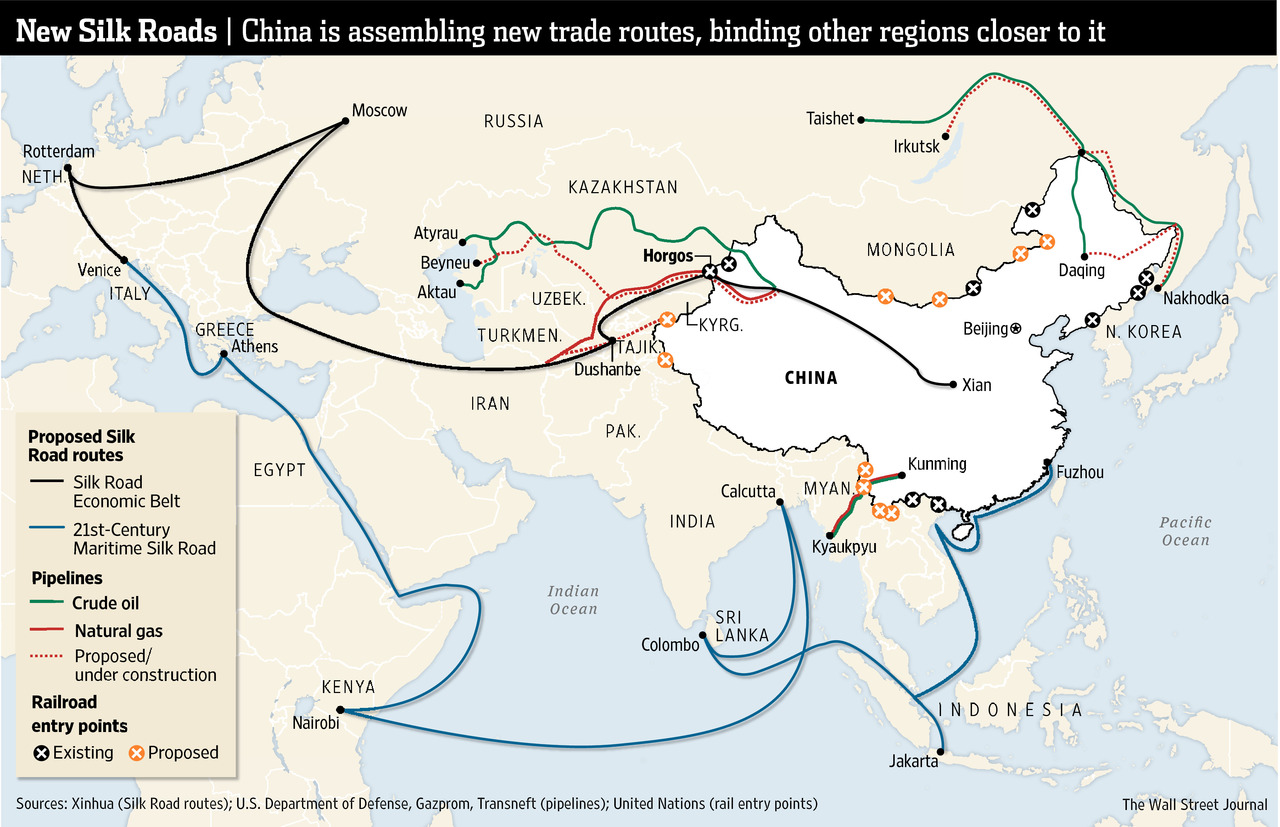 China’s New Silk Road initiative, also known as “One Belt, One Road,” aimed at expanding trade overseas. Photo credit: The Wall Street Journal
China’s New Silk Road initiative, also known as “One Belt, One Road,” aimed at expanding trade overseas. Photo credit: The Wall Street Journal
And to say without qualification that China and America are both neoliberal requires effacing the differences between the two. Neoliberalism is, after all, a specific form of relation between the state and economy, with much lip service paid to the return to classic free market principles, but in which the state power actually expands exponentially in order to maintain the conditions which allow for the preservation of the free market. Is it really possible to say, after all, the enormous institution of the IMF or World Bank is an institution of the “hands off,” laissez faire free market in which the government does not intrude into economic affairs?
Although the state and economy become closely tied in the American system as a result, can we truly compare China and America? Liu would seem to forget that America operates as a liberal bourgeois democracy where government has a significant influence over the economy but whose power is not absolute. For all ability of neoliberal corporations to buy out politicians and the limitations this has placed on democracy, politicians are still elected by the hands of the American people, and America operates on a multiparty system.
It is true that the two American parties would largely serve corporatist interest and often prove indistinguishable from one another in terms of actual political positions. But by contrast to America, China runs on a state capitalist system, in which the government has absolute power to manage economic affairs, in which there are no elections, and there is one ruling party. Apart from that there are in fact several puppet third-parties which the CCP props up in order to give itself illusion of legitimacy, if there were any attempt to form any other true political power, that attempt would be violently put down. However, what we can say about America is that any attempt to form a new political party will not be put down with force.
When Liu attempts to claim that the real enemy is neoliberalism and shifts discussion of what would incite the Sunflower Movement towards economic explanations, Liu is actually attempting to avoid dealing with the realities of state and military power. In claiming the true enemy is economic in nature and beyond borders, Liu is attempting to abstract the problem at hand for Taiwan, which is the encroachment of Chinese state and military power.
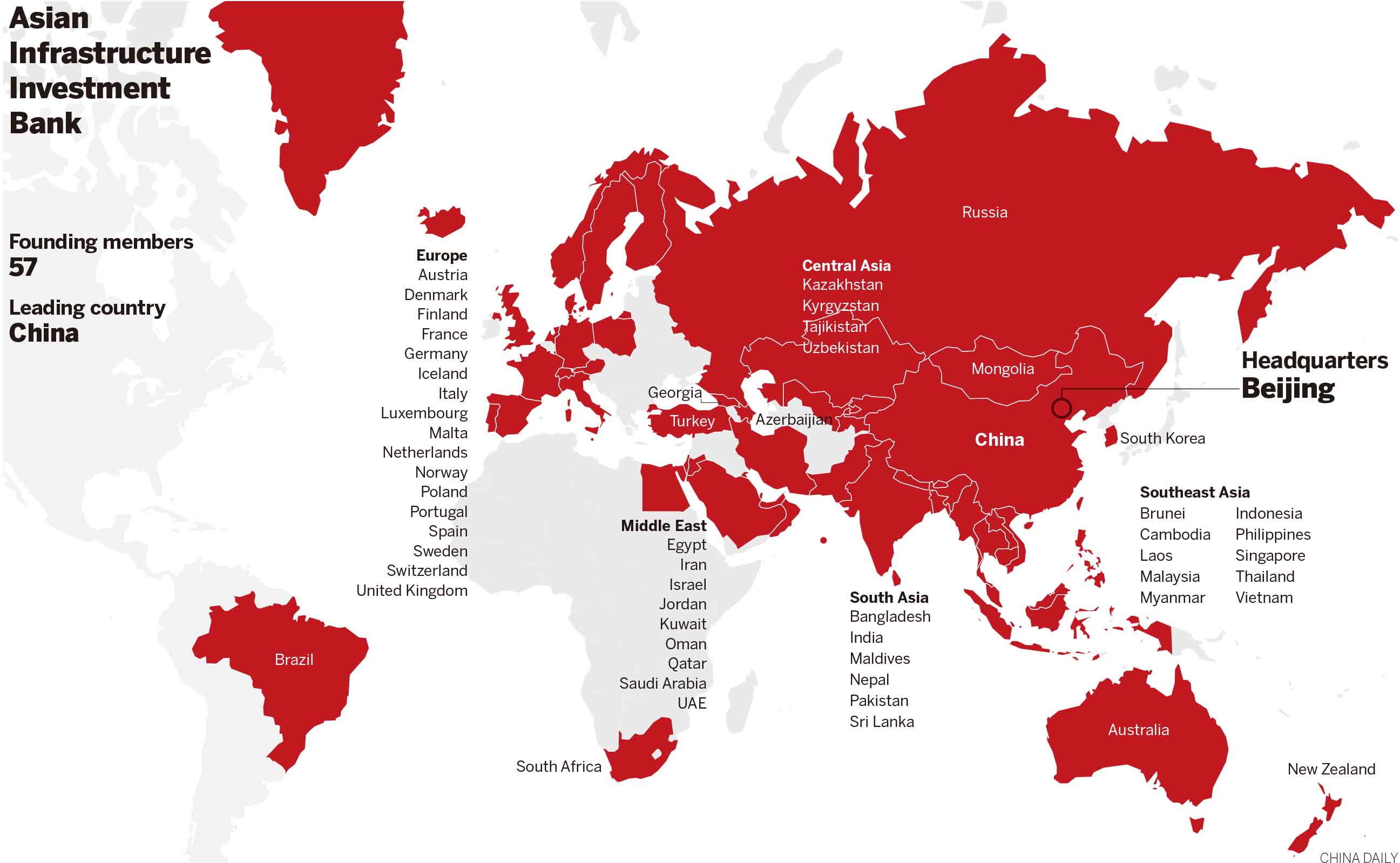 AIIB founding member nations. Photo credit: China Daily
AIIB founding member nations. Photo credit: China Daily
Any economic threat to Taiwan posed by, for example, a Chinese free trade agreement as the CSSTA has its true threat in that state and military power behind it, in which the economic integration of Taiwan into China by way of free trade agreements is the precursor to the forcible military integration of Taiwan and China. Moreover, if members of the pro-unification Left would want to make arguments about Taiwan’s subjugation to American hegemony as compared to possible Chinese military dominance, once more we see a difference between America and China. Of course, it is that America has hegemonic power over Taiwan because of Taiwan’s subordinate role to it in international affairs, but we find a difference where America does not have its missiles pointed at Taiwan, finger on the trigger at all times, with the order: “Obey.” This is so of China.
Taiwan’s subordination to America takes place because it is a client state of America. But if America desires to maintain the status quo of China at all costs and takes action to damage the credibility of political candidates it sees as too pro-independence—as it did to Tsai Ing-Wen in the past—Taiwanese can still decide their own political course through voting for a political candidate even when it goes against what America would like for Taiwan. Even then America would not intervene militarily to force Taiwan to conform to its will. On the other hand, Beijing would compel Taiwan to submit to its will militarily and very directly force Taiwan to become a province of China; at the very least America has no military designs to make Taiwan it’s fifty-first state.
This is not to claim that America is the lesser of two evils necessarily, but as to where the true sympathies of the pro-unification Left lie, it is always telling that they perpetually raise the critique of American imperialism but never the critique of Chinese imperialism. Why only criticize one but not both? This is part of where the pro-unification Left’s critique of American imperialism becomes a way of effacing the threat of China and, in fact, usually is aimed at the rationale of acting as an apologist for China.
In this sense, Liu’s claim that China and America are both neoliberal is also an attempt to minimize the threat of China. Even if Liu makes a gesture as to suggest some wrongdoing on the part of both China and America where they are both “neoliberal,” ultimately, compressing the differences between the two fails to grasp the substantial differences between American and Chinese domination as both encroach on Taiwanese sovereignty, and that it should be both which should be criticized. If Liu makes a gesture in pointing to some Chinese wrongdoing, this is only as a way of attempting to deflect blame from China by diffusing blame between both China and America. Ultimately, this pro-China bias reveals itself more clearly later in the article.
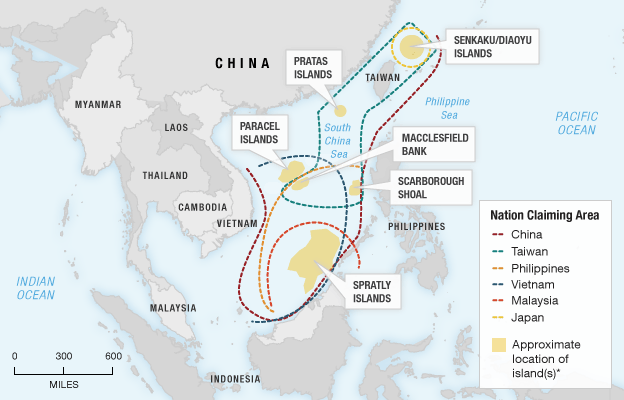 Disputed territories and their claimants in the South China Sea. Photo credit: Stephanie d’Otreppe/NPR
Disputed territories and their claimants in the South China Sea. Photo credit: Stephanie d’Otreppe/NPR
But Liu’s claim that the Sunflower Movement was truly a product of and reaction to neoliberalism, too, becomes an attempt to defuse the Sunflower Movement by avoiding its political causes as a product of the actions of the Chinese state’s stated intent to annex Taiwan or the KMT state’s persistent authoritarianism in order to raise economic factors as its true causes. Even if Liu is more sympathetic to the Sunflower Movement as having a form of validity, or being a genuine and sincere expression of the popular will of the Taiwanese public, actually, Liu’s article continues a larger tendency found in elements of the Taiwanese pro-unification Left as well as the Chinese New Left—an economic determinism which attempts to reductively explain national identity solely in terms of economic rationale. This is in order that the question of national identity can be disregarded as invalid—a problem which can be solved through economics.
So it is, for example, that the Chinese New Left sometimes imagines that ethnic tensions in Tibet and Xinjiang regarding systemic inequality towards non-Han groups can be solved purely through massive subsidies to Tibet and Xinjiang. With Taiwan, the flaring up of Taiwanese identity is explained as a product of Taiwan’s economic stagnation relative to China and nothing else, rather than fear of Taiwan’s democracy becoming crushed by Chinese one-party rule or a longstanding historical separation from China which dates back over a century.
It is true that strong sentiments of national identity flare-up in periods of national economic stagnation, but that is not to say that national identity has no existence and can explained solely in terms of economics. It is the existence of cultural or historical differences which give rise to national identity and this is not solely reducible to economic explanations. The pro-unification Left embraces a vulgar Marxism in regards to the understanding of national identity.
Whither The “Concept of China”?
AS SUCH THE weakest point of Liu’s article and where she betrays her true views is in its last section, with the problematic claim that the solution to Taiwan’s woes is embracing the “concept of China” (「中國」理念). This would be some form of “coexistence” between Taiwan and China—except Taiwan would operate within the framework of the “concept of China” in some sort of federation with China. Actually, though incredibly vague, Liu’s solution is to suggest an “alliance” with China rather than “unification” because presumably Taiwan would be allowed some autonomy through this system, what this reminds of is none other than Shih Ming-De’s proposed “federation” with China!
One might ask as well, after a long gloss about how the “true enemy” is neoliberalism, and not China, America, or Japan, why is the proposed solution to raise the “concept of China”? Why is “China” the proposed solution? Why not a broader notion of “international anti-capitalism” instead? Apparently, despite being “neoliberal,” China remains a “socialist” country and so Taiwan need join with it. Or this, too, may be “lesser evilism,” where it is perceived that America is the greater evil than China, and so rather than criticize both America and China, apparently Taiwan must not only side with the lesser evil but become a part of it. Here we see Liu’s short circuit in logic.
It would seem Liu has made something of a Freudian slip here, where the gap between Liu’s diagnosis of the problem and Liu’s proposed solution reveals her true underlying beliefs about what the relation of Taiwan and China should be. Hence, ultimately, Liu’s arguments do not fall far from the tree where the pro-unification Left is concerned.
Because in truth, Liu’s sentiments do not differ substantially from those adherents of the pro-unification Left who would simply desire Taiwan becoming part of China. A socialist alliance with China in the end, would not be a socialist alliance with China, but in the end simply just be China. Liu actually revives the old notion of socialist alliance dating back to the Soviet Union, which claimed to be a number of countries unified as part of the grand socialist alliance of the Soviet Union, that is, the Union of Soviet Socialist Republics (USSR). By contrast, despite being initially modeled after the Soviet Union, present day China claims to be a single nation just with a number of “minority nationalities” primarily located in “Special Autonomous Regions” of “outer China”—which are, of course, largely the former nations which were subsumed into the People’s Republic of China with its founding.
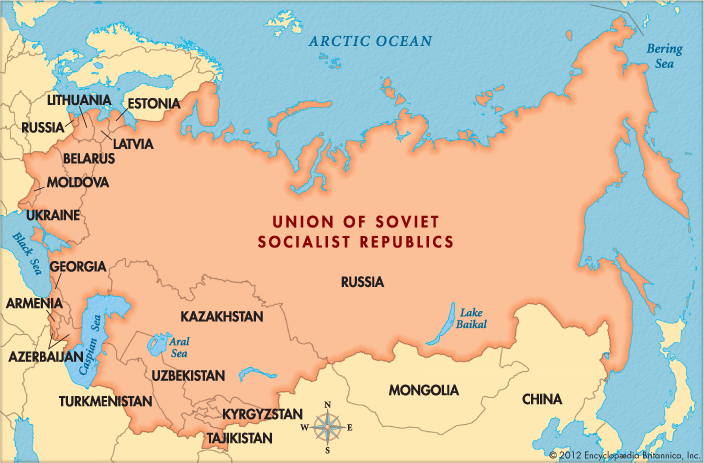 Map of the Soviet Union. Photo credit: Encyclopedia Britannica
Map of the Soviet Union. Photo credit: Encyclopedia Britannica
But despite its claim to be multiple nations, the Soviet Union was ultimately the domination of Russia over surrounding “nations” of the Eastern Bloc, as evidenced in a strong Russian bias and that the Soviet Union ultimately rose and fell on the basis of Russia and Russia alone. Would this be any different in a proposed Chinese alliance? Even if China claims to be just a single nation and not a set of nations, we already see the domination of “inner China” over “outer China”, that is, Xinjiang and Tibet, in contemporary China—as well the infringements of China against Hong Kong’s democracy, which was only recently added to China. Would it be the same with any other country or territory that became part of China? In the end, what would remain is the dominance of the Chinese state, rather than any system which allow for individual and collective autonomy. Liu seems blind to that her conclusion ultimately rules in such a statist solution.
It is bizarre, then, when Zhao Gang claims Liu’s solution to be an abstractly “anarchist” one and one in need of the Marxist critique of anarchism dating back to Marx’s critique of Proudhon. Zhao Gang is right to broadly point to the abstract nature of Liu’s vague “concept of China”, but apparently he seems to claim that Liu’s “concept of China” is apparently anarchist in nature on the basis of its abstract nature and therefore a revival of Proudhonian anarchism. For Zhao Gang’s ad hominem version of anarchism, apparently anarchism equals abstraction and abstraction equals anarchism, a rather poor definition of anarchism at that. Apparently, between an older, more hardline member of the pro-unification Left and one willing to rethink older assumptions as Liu, Zhao would require more directly statist solutions—betraying the Stalinist undertones of the Marxism of the pro-unification Left. Perhaps we can understand Zhao’s rather puzzling critique as a reaction against Liu being willing to grant too much autonomy to the Taiwanese people within the proposed framework of her “concept of China”, which is “anarchist” for Zhao.
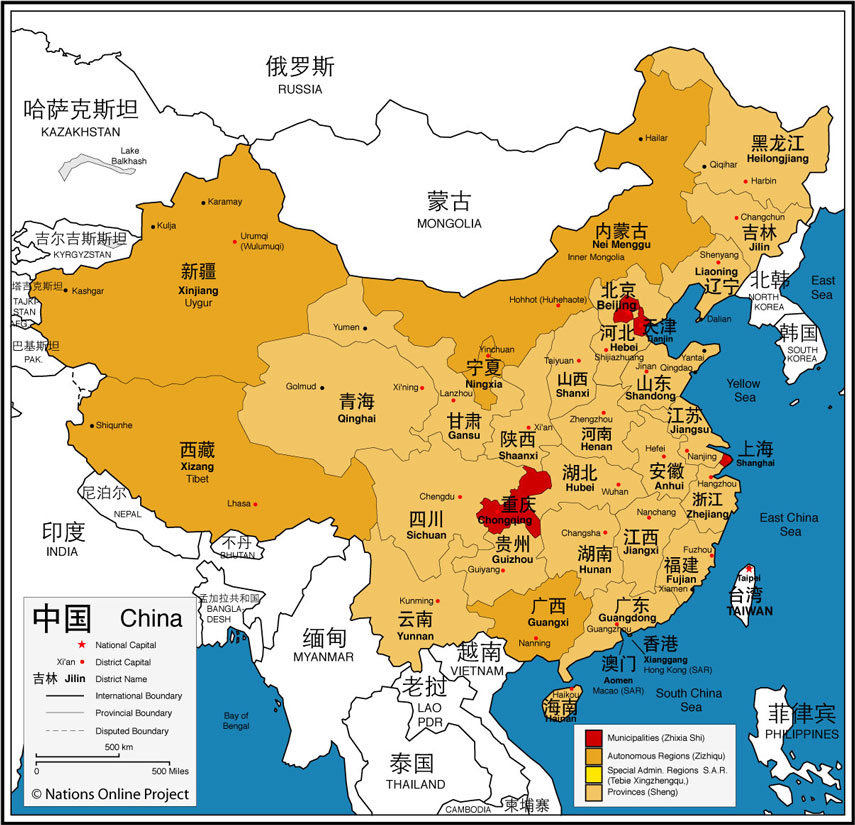 Map of China according to administrative divisions. Note the positioning of Autonomous Regions on the borders of China. Photo credit: Nations Online Project
Map of China according to administrative divisions. Note the positioning of Autonomous Regions on the borders of China. Photo credit: Nations Online Project
In Zhao Gang, we might note it is of little importance what exactly the majority of Taiwanese people identify as to the pro-unification Left. That the importance of anti-capitalism lay in the aspiration of the people towards democratic self-rule and self-determination, free of shackles that international capital, global imperialism, and the state places on the freedom of a people, has apparently been forgotten. It does not actually seem to matter to the pro-unification Left what the democratic aspirations of Taiwanese are.
This is not to say, of course, that any political Left should simply follow the political course of the rest of society agrees with. Indeed, in conditions where the right is embraced by society writ large, for example, as in fascism, the Left should be willing to go against the tide. But on the other hand, when the pro-unification Left claims that the Sunflower Movement or any other upsurge of Taiwanese society writ large is fascism, it is simply to justify in hyperbolic terms why exactly the pro-unification Left would go against a mass movement embraced by the majority of Taiwanese society. And the charges of fascism against Taiwanese society obscures the fact that the pro-unification Left has little interest in what exactly the democratic will of the Taiwanese people is, this charge rather serving as a self-righteous justification for the pro-unification Left in its disregard of the will of the Taiwanese people. Actually, Zhao Gang claims no less that to embrace China is what would be democratic and politically radical!
To be sure, we see this tendency in Liu, too, in her short-circuit in logic regarding the “concept of China” and her attempt to deconstruct the Taiwanese identity in a reductionist manner. Yet Liu evidences greater sympathy for the will of the Taiwanese people than Zhao Gang and would seem to have realized something that the other does not have. Zhao, on the other hand, just evinces a vaguely authoritarian viewpoint. But we might note that if like Zhao, Liu’s conclusions also remain fundamentally statist in nature, as her view is still a more moderate position compared to Zhao Gang, one can only imagine what those even more hardline that Zhao Gang are saying.
At Heart, What Are the Fears of the Pro-Unification Left?
WHAT ARE THE anxieties of the pro-unification Left as evidenced in the debate about Liu’s article? And why would it cause some controversy?Though to be sure, Liu evidences a rather strange definition of Taiwanese independence when she includes Ma Ying-Jeou and Chiang Kai-Shek, along with Chen Shui-Bian as advocates of Taiwanese independence, ultimately, this is still too much for individuals as Zhao Gang. Broadly, this reflects the anxieties of the pro-unification Left about ethnic and national identity.
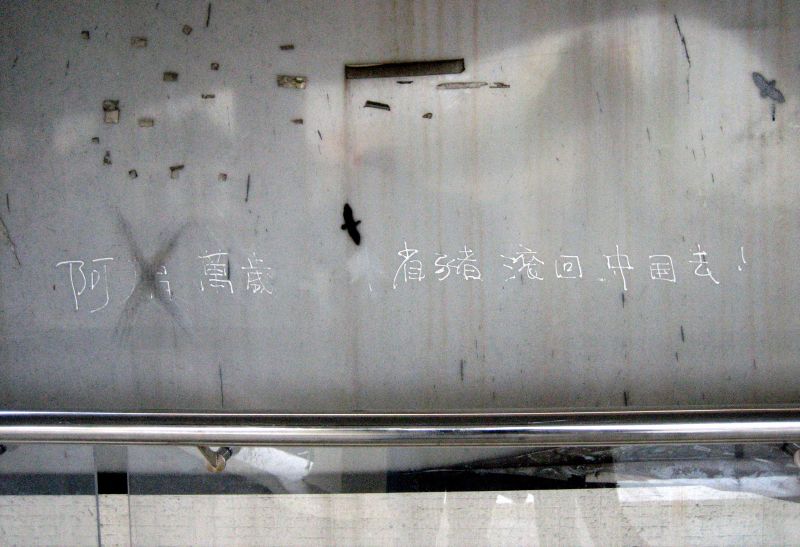 Graffiti in Daan, Taipei during Chen Shui-Bian’s presidency. The graffiti reads, “Long live Ah-Bian, waishengren pigs, go back to China!” Photo credit” Prince Roy/Wikimedia Commons
Graffiti in Daan, Taipei during Chen Shui-Bian’s presidency. The graffiti reads, “Long live Ah-Bian, waishengren pigs, go back to China!” Photo credit” Prince Roy/Wikimedia Commons
Why the pro-unification Left would be so terrified of something like the Sunflower Movement is a terror of populism and mass movements benshengren native Taiwanese nationalism. This strikes as a strange concern where the Marxist advocacy of popular revolution should lead to political views less terrified of mass movements, except for the fact that the pro-unification Left’s tendency towards economic reductionism, Cultural Revolution-style attacks on individuals on the basis of class background, and absolute terror of mass movements lead it to have more in common with Stalinism or Maoism than anything, even if members of the pro-unification Left might rarely claim to be Maoists or Stalinists.
In regards to the pro-unification Left’s reactions against the Sunflower Movement as an uprising of insurgent benshengren nationalism, there is certainly quite a bit of validity to the critique of benshengren ethno-nationalism that the pro-unification Left draws on. However, once again, this reflects the lack of attention to paid to the Sunflower Movement by the pro-unification Left, where the Taiwanese independence platforms which were expressed in the Sunflower Movement had an inclusive rather than exclusive sense of national identity. In fact, had they been paying any attention to the Sunflower Movement, they might have noted that the DPP was chastised by Sunflower Movement activists for intruding in on the movement, attempting to co-opt for its own purposes, and, importantly, attempting to play off of a benshengren Taiwanese nationalism which non-benshengren participants found alienating. Mainland Chinese speakers were also featured prominently at the movement. Where the pro-unification Left criticizes the so-called ethno-nationalism of the Sunflower Movement, they have in their minds an older form of Taiwanese nationalism which founded itself on a less inclusive framework. And so, overly hasty as they were to dismiss the Sunflower Movement, they fail to realize that this older ethno-nationalism is a thing of the past.
The critique of ethno-nationalism remains an important one, but in this respect it is one which needs to be seized back from the pro-unification Left, and made an integral part of the pro-independence Left. But actually, why does the pro-unification Left hold such anxieties concerning Taiwanese identity? For all the attempts by the pro-unification Left to criticize Taiwanese identity as an oppressive construct, the pro-unification is forever criticizing Taiwanese identity but rarely ever criticizes the Chinese sense of identity. This is a blind spot which reveals the true loyalties of the pro-unification Left. Where we see tension between Zhao and Liu, this is revealing of the different ways in which elements of the pro-unification Left conceive of their relation to China, and the pro-unification Left’s anxieties about their own identity.
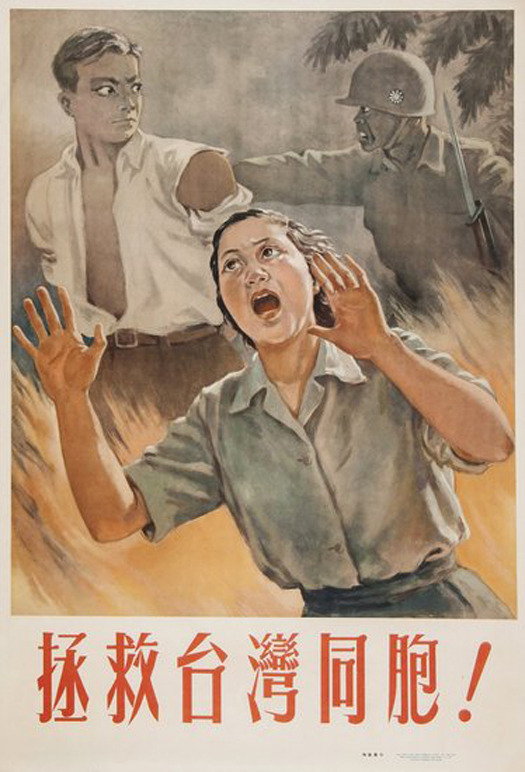 Chinese propaganda poster
Chinese propaganda poster
At heart this often seems to be the underlying issue which motivates the pro-unification Left. Underlying their political arguments, it would seem transcending all other political values is, in the end, the sense of identification with China—and not international Leftism. So, then, is the question of what the majority of Taiwanese identify as brushed off by the pro-unification Left. The democratic aspirations of Taiwanese or any other peoples as a Leftist concern is superseded entirely by the sense of identification and desire to unite with China.
It is true that the aspiration towards Taiwanese independence is not a position which is inherently anti-capitalist in nature, but despite the claims of the pro-unification Left otherwise, neither is unification with China. And if the pro-unification Left would critique the pro-independence Left for a Leftism which belies what they see as founded upon fundamentally a sense of Taiwanese national chauvinism, they are no less vulnerable to this charge regarding China. If a stronger case for how Taiwanese independence would advance international anti-capitalism remains to be made, more broadly we might ask the question, can a Leftism which is not international in nature truly overcome international capitalism? Ultimately where its sense of identification with China trumps all else, the pro-unification Left remains unable to answer this question.










